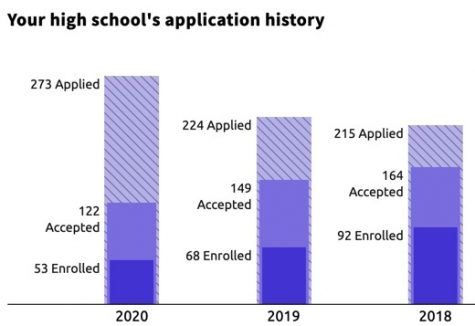How Do College Deferrals Affect the Class of 2021?
As seniors rapidly approach the college application season, uncertainty surrounding COVID-19 hangs over their heads, specifically when it comes to acceptance. While there is still the usual turmoil of GPA, standardized testing results, transcripts and filling out applications, there is a new question that looms: will students deferring in the year above us make the acceptance rates for our class lower?
Many financial and college support websites suggest deferring from college in fall 2020. Whether they suggest it to protect oneself from a less than normal experience or in order to save money, many students seem to have jumped at this offer. According to the Boston Globe, 25 percent of Harvard’s first-years, 8 percent of MIT first-years and a whopping 90 percent of William’s College students have all decided to defer and take a gap year. But is this the same for schools closer to home? Unfortunately, it seems like it is.
CU Boulder is one of the schools that BVSD students know well. It’s only five minutes away from our own campus and many students choose to continue their education there. According to a Daily Camera article, “1,247 [CU] students planning to enroll this fall deferred their enrollment.” This number is almost 1,000 students more than in a normal year and while usually many students that defer end up not returning in a normal year, Patrick O’Rourke, the Interim Chief Operating Officer states that “admissions staff think that [the] number [returning] will be much higher” than it normally would. The Daily Camera article went on to address the impacts on CU Boulder’s budget, but this number left me wondering what deferred enrollment means for the class of 2021.

The Denver Post spoke with Patrick O’Roarke about the concern that CU will “have a super-sized class for next year.” It seems as though CU Boulder has yet to develop a plan but O’Roarke did mention that deferrals would be considered “when admitting next year, to get capacity right” seemingly implying that CU’s admission numbers will be lower than usual. While I don’t think this applies to all schools—during an interview I had with Lewis and Clark, it was mentioned that admissions rates would be the same at their school this year— the fact that it’s even a consideration is a bit unsettling.
While looking through the CU deferral policy, I discovered a few key things that seem like they would affect this year’s seniors the most. First of all, students that defer are not guaranteed on-campus housing, leaving dorm space a priority for typical first-year students. However, they don’t lose their scholarships awarded by the Office of Admissions. The scholarship opportunities are awarded to the most impressive applicants chosen by GPA, test scores and other factors. A larger pool of applicants seems like it could diminish the scholarship money allocated for this year’s first-time applicants.
While so much is still up in the air, and there is no guarantee that CU will be admitting fewer students come spring, I think we will all rest much easier when the college application season is over and we’re able to breathe easy.

Isabel Oliver is a senior at Boulder High this year. Although new to The Owl, she has always loved writing and literary arts. Isabel grew up with an Editor in Chief for a mother and has always been fascinated by the inner workings of journalism. Isabel joined The Owl to improve her journalistic writing and to report on current events that she’s passionate about. Outside of The Owl, you can find Isabel acting with Troupe 60, singing in the choir, reading a good book, watching copious amounts of Netflix, or jamming with her band. After graduating from Boulder, she hopes to go to college and become either a therapist or a social worker - although she’s leaning towards liberal arts, so that’s...

